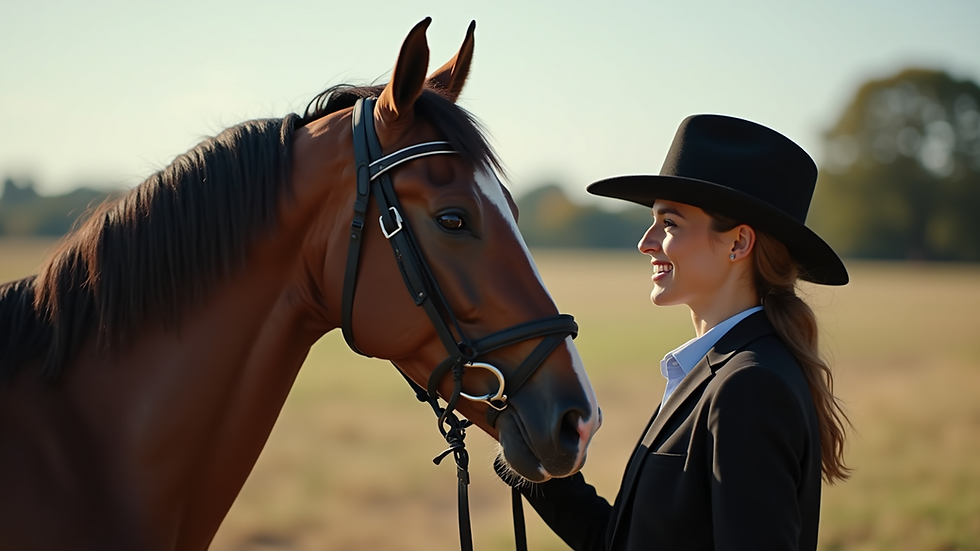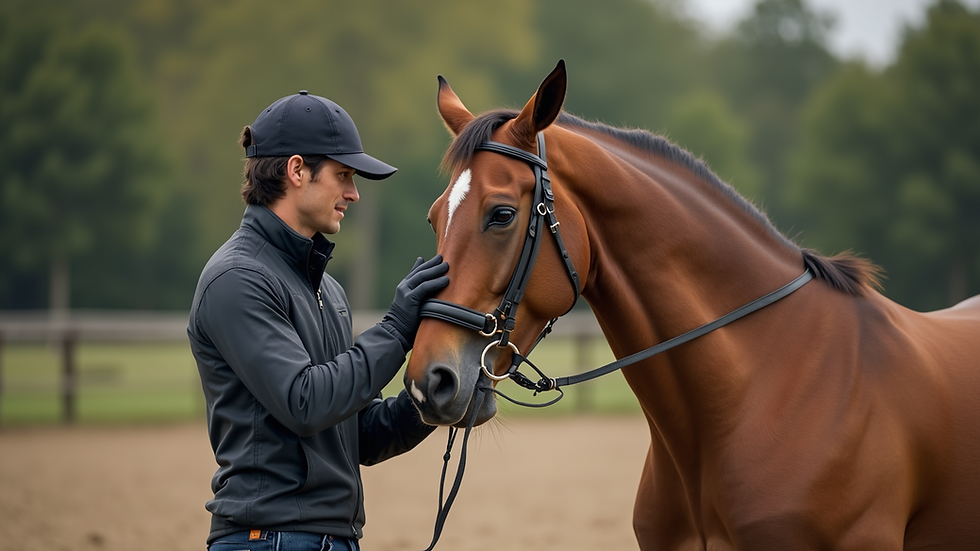Holistic Horse Training: A Compassionate Approach
- Macy Johnson
- Jul 5
- 5 min read
Horse training is often seen as a strict discipline, filled with rules and techniques. However, there is a growing movement towards a more compassionate and holistic approach. This method focuses on understanding the horse as a whole being, rather than just a tool for riding or competition. In this blog post, we will explore the principles of holistic horse training, its benefits, and practical tips to implement this approach in your own training routine.
Holistic horse training emphasizes the connection between the horse and the trainer. It recognizes that horses are sentient beings with emotions, instincts, and individual personalities. By fostering a deeper bond, trainers can create a more effective and enjoyable training experience for both horse and rider.
Understanding the Holistic Approach
The holistic approach to horse training is rooted in the idea that every aspect of a horse's life affects its behavior and performance. This includes physical health, mental well-being, and emotional stability. Here are some key components of this approach:
Physical Health: A horse's physical condition plays a crucial role in its ability to learn and perform. Regular veterinary check-ups, proper nutrition, and appropriate exercise are essential.
Mental Well-being: Horses are intelligent animals that thrive on mental stimulation. Boredom can lead to behavioral issues. Incorporating variety in training can keep a horse engaged and happy.
Emotional Stability: Just like humans, horses experience emotions. Understanding their feelings can help trainers respond appropriately to their needs.
By considering these factors, trainers can create a more balanced and effective training program.
Building Trust and Connection
One of the cornerstones of holistic horse training is building trust between the horse and the trainer. Trust is essential for effective communication and cooperation. Here are some strategies to foster trust:
Consistent Handling: Use consistent cues and handling techniques. This helps the horse understand what is expected and reduces anxiety.
Positive Reinforcement: Reward desired behaviors with treats, praise, or gentle pats. This encourages the horse to repeat those behaviors.
Patience and Understanding: Every horse learns at its own pace. Be patient and understanding, allowing the horse to process new information without pressure.
By creating a trusting relationship, trainers can enhance the learning experience and improve performance.
Incorporating Natural Behaviors
Horses are herd animals with natural instincts. A holistic approach respects these instincts and incorporates them into training. Here are some ways to do this:
Social Interaction: Allow horses to interact with other horses. This helps them develop social skills and reduces stress.
Natural Movement: Encourage natural movement patterns during training. This can include free lunging or allowing the horse to explore its environment.
Play and Exploration: Incorporate play into training sessions. This can be as simple as allowing the horse to investigate new objects or engage in playful activities.
By respecting and incorporating natural behaviors, trainers can create a more enjoyable and effective training environment.
The Role of Environment
The training environment plays a significant role in a horse's well-being. A calm and safe environment can enhance learning and reduce stress. Here are some tips for creating a positive training space:
Quiet Spaces: Choose a quiet area for training, away from distractions. This helps the horse focus and feel secure.
Safe Equipment: Ensure that all equipment is safe and comfortable for the horse. This includes saddles, bridles, and any training aids.
Comfortable Conditions: Pay attention to the weather and ground conditions. Avoid training in extreme heat or cold, and choose a safe footing for the horse.
A well-thought-out environment can significantly impact the success of training sessions.
Mindfulness in Training
Mindfulness is an essential aspect of holistic horse training. Being present and aware during training can improve communication and understanding. Here are some mindfulness practices to consider:
Focus on the Horse: Pay attention to the horse's body language and reactions. This can provide valuable insights into its feelings and needs.
Breathe and Relax: Take deep breaths and stay relaxed. Horses can sense tension and anxiety, which can affect their behavior.
Reflect on Sessions: After each training session, take a moment to reflect on what went well and what could be improved. This helps in continuous learning and growth.
By practicing mindfulness, trainers can enhance their connection with the horse and improve the overall training experience.
Practical Tips for Holistic Training
Implementing a holistic approach to horse training can be rewarding. Here are some practical tips to get started:
Set Realistic Goals: Establish achievable goals for both you and your horse. This helps maintain motivation and reduces frustration.
Keep Sessions Short: Horses have limited attention spans. Short, focused training sessions are often more effective than long ones.
Incorporate Variety: Mix up training routines to keep things interesting. This can include different exercises, locations, or even types of equipment.
Listen to Your Horse: Pay attention to your horse's responses. If it seems stressed or uninterested, it may be time to change your approach.
By following these tips, trainers can create a more enjoyable and effective training experience for both themselves and their horses.
The Benefits of Holistic Training
Adopting a holistic approach to horse training offers numerous benefits. Here are some of the most significant advantages:
Improved Performance: Horses that are happy and healthy are more likely to perform well. A holistic approach addresses their needs, leading to better results.
Stronger Bond: Building trust and understanding fosters a stronger bond between horse and trainer. This relationship can enhance communication and cooperation.
Reduced Stress: A compassionate approach reduces stress for both horse and trainer. This creates a more positive training environment.
Long-term Success: Holistic training focuses on the long-term well-being of the horse. This leads to sustainable success and a happier horse.
By embracing these benefits, trainers can create a more fulfilling experience for themselves and their horses.
Embracing the Journey
Holistic horse training is not just about achieving specific goals. It is about embracing the journey and enjoying the process. Each horse is unique, and the training experience should reflect that individuality.
As you embark on this journey, remember to celebrate small victories and learn from challenges. The bond you create with your horse will be one of the most rewarding aspects of your training experience.

In conclusion, holistic horse training offers a compassionate and effective approach to working with these magnificent animals. By focusing on the whole horse, trainers can create a more enjoyable and successful training experience. Embrace the principles of holistic training, and you will not only improve your horse's performance but also deepen your connection with this incredible creature.
As you continue on this path, remember that the journey is just as important as the destination. Enjoy every moment with your horse, and let your training be a reflection of the love and respect you have for them.


Comments